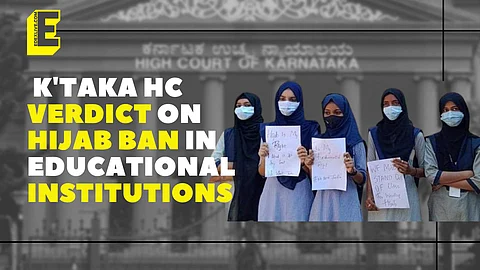

The Karnataka High Court has upheld the restriction on wearing hijabs in the classroom and has said that schools have the right to prescribe a uniform and any "reasonable accommodation" to allow the wearing of hijab would stand contrary to the uniform. The court also said that the hijab cannot be viewed as an essential religious practice and, therefore, protection under Article 25 of the Constitution cannot be claimed.
After 11 days of plea hearings, the court distilled the debate to four major questions:
1. Whether wearing the hijab is part of essential religious practice under Islamic faith, protected under Article 25 of the Constitution?
2. Whether prescription of school uniform is not legally permissible as being violative of the petitioners' fundamental rights under Article 19 (1) A, Freedom of Expression and Article 21, Right to Privacy of the Constitution?
3. Whether the GO dated 5/2/2022, apart from being incompetent, is issued without application of mind and, further, is manifestly arbitrary and therefore violates Article 14 and 15 of the Constitution?
4. Whether any case is made out in the writ petition for the issuance of a direction for initiating disciplinary inquiry against respondent number 6-14 and for issuance of a writ of quo warranto against respondents 15 and 16?
Here's how the Bench went about answering each one of them.
Hijab as Essential Religious Practice
The court turned to the judgment in the case of Acharya Jagdishwaranand Avadhuta and Ors v. Commissioner of Police, Calcutta, 1984, which said, "Essential practice means those practices that are fundamental to follow a religious belief. It is upon the cornerstone of essential parts or practices that the superstructure of a religion is built, without which a religion will be no religion. Test to determine whether a part of practice is essential to a religion is to find out whether the nature of the religion will be changed without that part or practice." The court noted that the foundation of the religious practice pre-dating the foundation of the religion is an essential marker in the test of ERP and a practice being merely followed since time immemorial does not stand up to this requirement.
The judgment read, "At the most, the practice of wearing this apparel may have something to do with culture but certainly not with religion. Thus, it can be reasonably assumed that the practice of wearing hijab had a thick nexus to the socio-cultural conditions then prevalent in the region. What is not religiously made obligatory, therefore, cannot be made a quintessential aspect of the religion through public agitations or by passionate arguments in courts."
Prescription of uniforms by schools
Upholding the right of the educational institutions to prescribe uniforms, the High Court said, "School uniforms promote harmony and spirit of common brotherhood transcending religious or sectional diversities. This apart, it is impossible to instill the scientific temperament which our Constitution prescribes as a fundamental duty vide Article 51A(h) into the young minds so long as any propositions such as wearing of hijab or bhagwa are regarded as religiously sacrosanct and, therefore, not open to question. They inculcate secular values amongst the students in their impressionable and formative years."
Dismissing the plea for "reasonable accommodation" to allow students to wear hijab of the same colour as the uniform, the court that doing so would mean that the uniform ceases to be uniform. "There shall be two categories of girl students viz., those who wear the uniform with hijab and those who do it without. That would establish a sense of ‘social-separateness’, which is not desirable. It also offends the feel of uniformity which the dress code is designed to bring about amongst all the students regardless of their religion and faiths."
The court also dismissed the petitioners' claim that classrooms should reflect diversity and made note of a judgment from the House of Lords of the United Kingdom that set schools apart from other public places and focused on the role of a uniform dress code to promote harmony among people from diverse backgrounds, and "fostering a sense of community and cohesion".
The court also added that the example of the Kendriya Vidhayalas that allow the hijab will not be applicable here because education is a concurrent subject, and "the States need not toe the line of Centre."
The contested Government Order of February 5, 2022
During the hearings, there was considerable debate on the usage of the term "public order" in the GO being contested by the petitioners, who claimed that the hijab in no way affects public order as is defined in the constitution. The Bench was of the opinion that the term cannot be interpreted the same as was used in the Constitution. "The text and context of the Act under which such orders are issued also figure in the mind. The impugned order could have been well-drafted, is true," submitted the court and concluded that there are no grounds for invalidating the order which says that students should follow prescribed uniforms of their educational institutions.
Action against the college authorities
The petitioners had also sought an inquiry into the "hostile approach" and violation of departmental guidelines by the Principal and teachers of the Government Pre-University College in Udupi. The court was of the opinion that the petition in this regard was not well-drafted and lacked coherence, and added that departmental guidelines have no force of law.
Hijab vs emancipation of women?
The court also held that the hijab was contrary to the objective of emancipation of women. "There is a lot of scope for the argument that insistence on wearing a purdah, veil or headgear in any community may hinder the process of emancipation of women, in general, and Muslim woman, in particular. That militates against our constitutional spirit of ‘equal opportunity’, of ‘public participation’ and ‘positive secularism’," said the court, noting that Muslim women are free to wear the hijab anywhere outside of the classroom.
